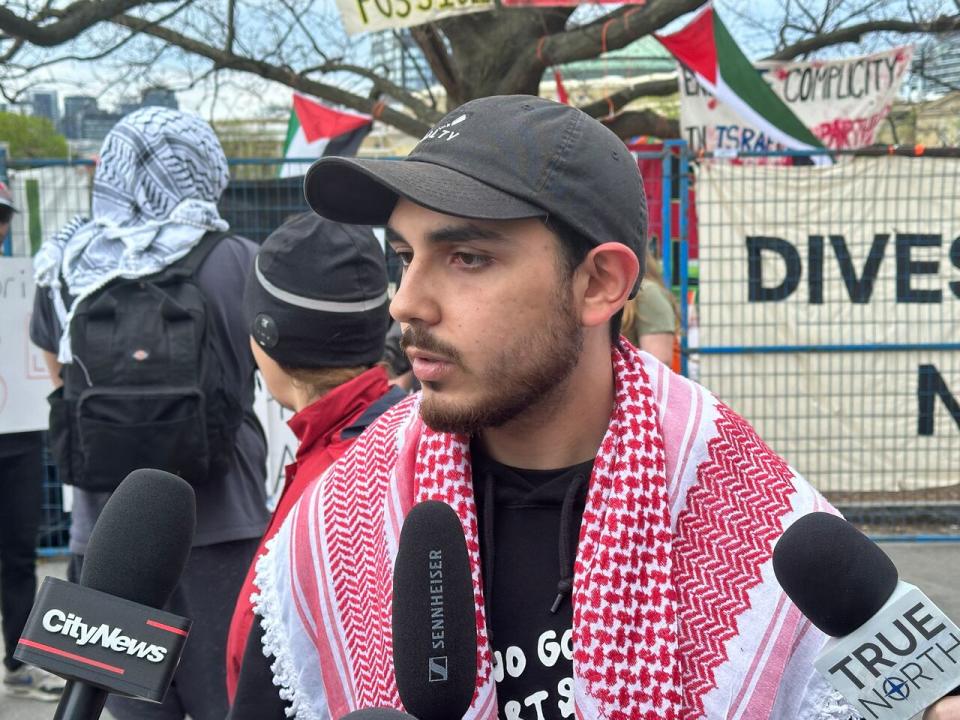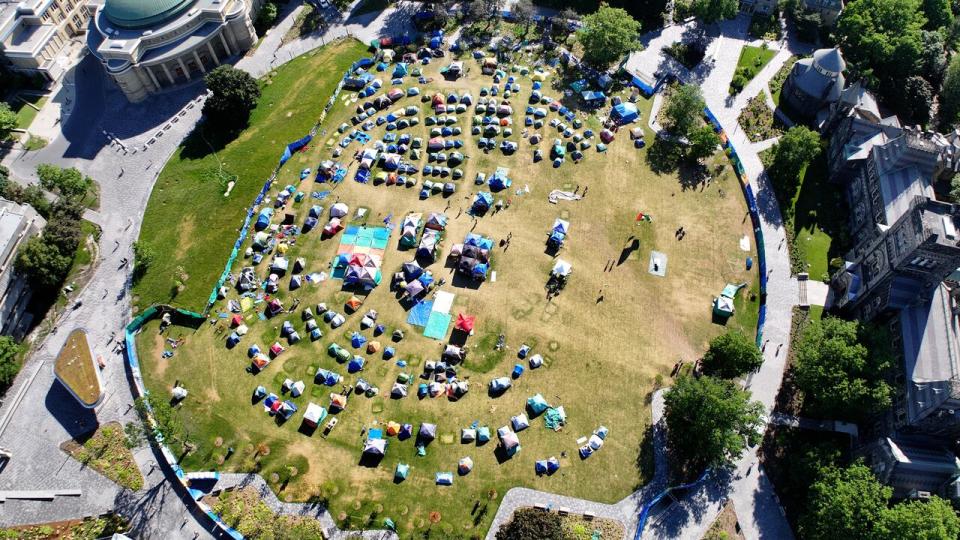U of T gets injunction to clear encampment
An Ontario court has granted an injunction to the University of Toronto to clear a pro-Palestinian encampment on school property.
The Ontario Superior of Court of Justice ruled Tuesday that protesters must take down tents in an area known as King's College Circle by Wednesday at 6 p.m.
The order by Justice Markus Koehnen also gives Toronto police the authority to arrest and remove anyone who refuses to comply with the court order.
In a statement following the decision, U of T president Meric Gertler said the school has sent a letter to Toronto Police asking for their help if the encampment is not cleared by the deadline set by the injunction.
"The university welcomes vigorous debate and protest. Today's court order returns Front Campus to the entire university community and prevents any one group from asserting control of a shared space at the university in order to promote a particular view and deprive others of the freedom to express opposing viewpoints," Gertler said in the statement.
A spokesperson for the school said the administration expects protestors to abide by the court order and vacate the encampment before Wednesday's deadline.
"We trust that those in the encampment will abide by the court order and vacate the encampment before the court-imposed deadline. Anyone who chooses to remain in the encampment after that deadline will be subject to consequences under university policy and the law," the school said on its website.
U of T Occupy for Palestine, the organizers of the encampment, said in a post on X, formerly Twitter, that the decision means that the school has been granted the "immoral license to unleash police violence" on students.
"The university's shameful attempt to use legal force to brutalize its own students — for the crime of protesting genocide— will go down in history as a disgraceful chapter for this institution," the post reads.
'Our resolve is stronger than ever': protest organizer
Mohammad Yassin, a protest organizer with U of T Occupy for Palestine, said the injunction "changes nothing" about the injustice against which the students are fighting.
"Make no mistake, our resolve is stronger than ever. We've said from day one that we will not leave this campus until U of T discloses divests and cuts ties. That commitment stands firm.
"Instead of reflecting on their complicity in this genocide, the administration has fought tooth and nail for a patch of grass and the authoritarian power to silence their students. Yet we are still here despite all the obstacles placed in our way, firm and determined to continue the fight fo the humanity of our brothers and sisters in Gaza," Yassin said.

Protesters set up tents at the site of U of T's downtown campus on May 2. Organizers of the encampment have called on the university to cut its ties with Israel, divest from companies profiting from Israel's offensive in Gaza and end partnerships with the country's academic institutions deemed complicit in the war.
The encampment is part of a massive wave of pro-Palestinian demonstrations at post-secondary institutions in Canada and the United States.
Israel launched its attack after Hamas led a surprise assault on southern Israel on Oct. 7, which left roughly 1,200 dead and saw around 250 people taken hostage. Israel's offensive has left 37,000 dead in Gaza, according to Palestinian tallies.
In January, the top United Nations court, when ruling on South Africa's genocide case against Israel, concluded that some of the actions alleged to have been committed by Israel in Gaza "appear to be capable of falling within the provisions of the (Genocide) Convention."
It ordered Israel to prevent and punish any public incitements to commit genocide against Palestinians in Gaza and preserve evidence related to genocide allegations. Israel has strongly denied that any of its actions constitute incitement of genocide.
Injunction allows protest; no structures, blocking entrances
According to the ruling, the injunction allows the protesters to demonstrate throughout the campus, but it prevents them from camping, erecting structures, blocking entrances to university property and protesting on campus between 11 p.m. and 7 a.m.
"As a result, the injunction does not limit the freedom of expression that the law provides," the judge wrote in his decision.
The judge said in his reasons that the university argued that it has the right as the property owner to decide how the property is used, while the protesters saw the case as dealing with "freedom of expression, association and assembly."
"In our society we have decided that the owner of property generally gets to decide what happens on the property. If the protesters can take that power for themselves by seizing Font Campus, there is nothing to stop a stronger group from coming and taking the space over from the current protesters. That leads to chaos."

The protesters also argued the school's claims of irreparable harm were "grounded in troubling mischaracterizations" of the encampment as violent and antisemitic.
The judge said the university's argument that the encampment was violent or antisemitic was weak.
However, he said the school did make a strong case to show that the protesters took over Front Campus, which includes King's College Circle, from the university and prevented others from using it for 50 days.
"The case law is clear that this type of loss of use amounts to irreparable harm," the judge wrote. "In my view, the harm to the university is greater if the injunction is not granted than is the harm to the respondents if the injunction is granted."
But the judge added that the protesters shone a "bright light" on what universities should or should not invest in. He added that he found the encampment to be peaceful.
"I also accept that acts of intimidation and assault have been directed against Jewish passersby and encampment members at Front Campus. There is no evidence, however, to suggest that any of the named respondents or any other encampment members were in any way involved in those acts," he said.
Jewish intervenor groups praise ruling
A group of Jewish and pro-Israel organizations who were granted intervenor status in the case praised the ruling. The groups include UJA Federation of Greater Toronto, Friends of Simon Wiesenthal Center, and the Centre for Israel and Jewish Affairs.
"We are relieved that the Ontario court has granted an injunction, eliminating any doubt that the University of Toronto may legally — and finally — remove the hateful and disruptive encampment from its campus," Rabbi Seth Goren, CEO of Hillel Ontario, said in a statement on behalf of the group.
The groups called on the university, the city and the Toronto Police Service to "dismantle" the encampment at Wednesday's deadline.
"Antisemitism is millennia-old, and we know that a single injunction will not wipe this bigotry from campus or the world," the statement said.
"As such, we continue to call on the U of T administration, Mayor Olivia Chow, and other civic leaders to make clear through their actions that conduct of this nature will not be tolerated and that antisemitism has no place on campus."

 Yahoo News
Yahoo News 
